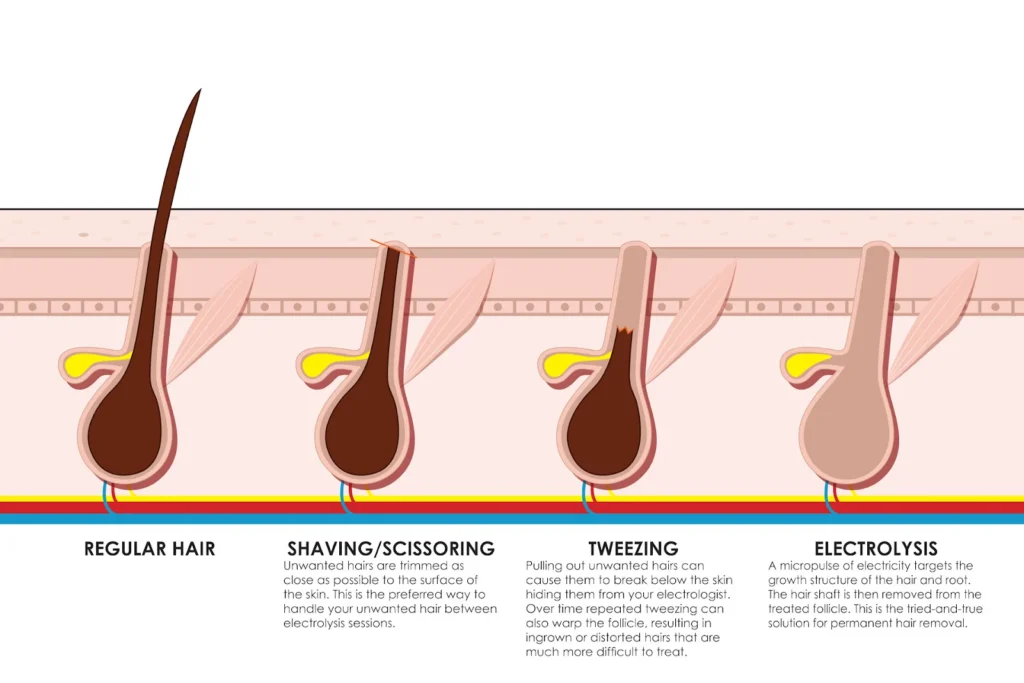The quest for smooth, hair-free skin has led to the development of various hair removal methods, each with its own set of benefits and considerations. Two prominent contenders in the realm of long-term hair removal are electrolysis and laser hair removal. Hair removal blog post from Ulike will compare these two techniques to help you make an informed decision based on your preferences, needs, and skin characteristics.
Electrolysis

Electrolysis is a hair removal method that involves inserting a tiny probe into the hair follicle to deliver an electric current, which destroys the hair follicle’s ability to regrow hair. This method is often used for small, targeted areas and is considered effective for all skin tones and hair colors.
Pros of Electrolysis
Precision: Electrolysis targets individual hair follicles, making it suitable for smaller areas and finer hair.
Suitable for All Hair Colors: Unlike laser hair removal, electrolysis is effective on all hair colors, including blonde, red, and gray hair.
Permanent Results: Electrolysis is FDA-approved for permanent hair removal, making it a viable solution for long-term hair reduction.
Safe for All Skin Types: It’s safe for all skin types and tones, including darker skin tones.
Cons of Electrolysis
Time-Consuming: Electrolysis treats one hair follicle at a time, making it time-consuming for larger areas.
Discomfort: The process can be uncomfortable, as it involves inserting a probe into each follicle.
Potential Scarring: If not performed by a skilled professional, there’s a risk of scarring and skin damage.
Maintenance Sessions: Touch-up sessions may be needed for complete and permanent hair removal.
Laser Hair Removal
Laser hair removal devices utilizes focused light energy to target melanin in the hair follicles, damaging them and inhibiting hair growth. It’s most effective on individuals with light skin and dark hair.
Pros of Laser Hair Removal
Speed: Laser treatments cover larger areas quickly, making them suitable for larger body parts.
Less Discomfort: Compared to electrolysis, laser hair removal is generally less painful, with sensations likened to snapping a rubber band against the skin.
Efficiency: It’s efficient for reducing hair growth on larger areas like the legs, back, and chest.
Predictability: Many users experience permanent hair reduction after a series of sessions.
Cons of Laser Hair Removal
Skin Tone and Hair Color Limitations: Laser hair removal is most effective on individuals with light skin and dark hair due to the contrast between the hair and skin.
Not Permanently Approved: While laser hair removal offers long-term reduction, it’s not universally approved by the FDA as a method for permanent hair removal.
Potential for Regrowth: Some individuals may experience regrowth over time, requiring maintenance sessions.
Multiple Sessions Required: A series of sessions is needed to target hairs in different growth cycles.

Conclusion
The choice between electrolysis and laser hair removal depends on factors such as your skin tone, hair color, pain tolerance, treatment area, and desired results. Electrolysis offers permanent results on all hair colors but is time-consuming. Laser hair removal is quicker and efficient for larger areas, but works best on individuals with lighter skin and darker hair. Consult with a licensed professional or dermatologist to determine which method aligns best with your unique characteristics and preferences, ensuring you achieve the smooth, hair-free skin you desire.








